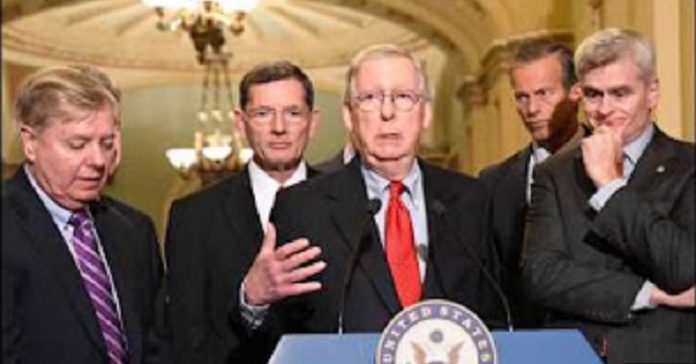With the way congressional Republicans talk about the Obamacare individual mandate, one might believe they have always vehemently opposed the idea of a penalty for those Americans who do not have healthcare coverage.
Senate Republicans will vote next week on a tax plan that includes a repeal of the Obamacare individual mandate, getting rid of the financial penalty given to those who are uninsured.
Senator Bill Cassidy (R-La.) said:
“Getting rid of Obamacare’s tax on people who choose not to buy a plan or can’t afford the premiums is the right thing to do.”
Despite the appearance to the contrary, not long ago many Republicans supported the idea of the individual mandate. In fact, 30 years ago when the party was entirely different, it was a conservative who originated the idea of the individual mandate.
In 1989, Stuart Butler was the director of domestic policy studies at the Heritage Foundation, a long time bastion of conservative thought. During this era, many conservative thinkers supported the idea of universal health coverage.
While they supported the idea, they had significant reservations about expanding government programs or mandating that employers pay for coverage.
To reconcile the idea of universal coverage with a desire to limit the size and scope of government programs, Butler devised a plan that would couple a fine for those who refused to get insurance with government subsidies that would make coverage more easily affordable.
Butler explained the plan saying:
“This requirement would imply a compact between the U.S. government and its citizens. In return for the government’s accepting an obligation to devise a market-based system guaranteeing access to care and protecting all families from financial distress due to the cost of an illness, each individual must agree to obtain a minimum level of protection.”
It was also Butler’s idea that the system should avoid a “free rider” issue, where people obtain services without contributing to the cost. He said of this concern, and as an argument in favor of a fine for those who refused to obtain coverage:
“If a man is struck down by a heart attack in the street, Americans will care for him whether or not he has insurance. If we find that he has spent his money on other things rather than insurance, we may be angry but we will not deny him services ― even if that means more prudent citizens end up paying the tab. …Each household has the obligation, to the extent it is able, to avoid placing demands on society by protecting itself.”
While Butler’s ideas did not garner immediate favor with Republican lawmakers, by the time Bill Clinton became president and healthcare was at the forefront of the Democrats’ agenda, 20 Republican Senators co-sponsored a bill as a response to Clintoncare. Included in the Republican bill was an individual mandate. Two of the co-sponsors of the bill were Charles Grassley (R-Iowa) and Orrin Hatch (R-Utah), who remain Senators today.
It was not until former President Barack Obama fully embraced the idea of an individual mandate that Republicans became adamantly opposed to the suggestion. It seems Republicans were more committed to opposing Obamacare at all costs then they were in the ideas Obamacare furthered.
The flip-flop was both drastic and complete, and come next week, the Senate will vote, in part, on whether or not the individual mandate will remain the law of the land.
Featured Image Via YouTube Video.











